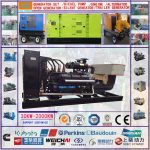Introduction
Durability testing is an essential process in the development of various products, ranging from automotive components to electronic devices. It involves subjecting a product or component to rigorous conditions to evaluate its performance and reliability under varying stresses. One critical component in the field of durability testing is the diesel generator, which plays a vital role in providing reliable power supply for conducting tests in controlled environments. In this article, we will explore the importance of diesel generators in durability testing, their key features, and considerations for selecting the right generator for testing applications.
Importance of Diesel Generators in Durability Testing
Durability testing involves subjecting products to extreme conditions, such as temperature variations, mechanical stresses, and environmental factors, to assess their performance over time. These tests are crucial for ensuring that products meet quality standards and can withstand real-world conditions without failure. To conduct such tests effectively, a reliable power source is essential to provide consistent and uninterrupted power supply to the testing equipment.
Diesel generators are widely used in durability testing applications due to their robustness, reliability, and ability to provide continuous power for extended periods. Unlike other types of generators, diesel generators are known for their durability, high power output, and fuel efficiency, making them ideal for powering heavy-duty equipment used in durability testing. The consistent power supply from diesel generators ensures that testing procedures are not interrupted, allowing engineers to obtain accurate and reliable data on the performance of the products under test.
Key Features of Diesel Generators for Durability Testing
1. Robust Construction: Diesel generators are designed to withstand harsh operating conditions, making them well-suited for durability testing environments. The robust construction of diesel generators ensures long-term reliability and durability, even when subjected to high loads and continuous operation.
2. High Power Output: Diesel generators are capable of delivering high power output, making them suitable for powering a wide range of testing equipment, including hydraulic systems, vibration tables, and environmental chambers. The high power output of diesel generators ensures that testing procedures can be conducted efficiently without power limitations.

3. Fuel Efficiency: Diesel generators are known for their fuel efficiency, which is essential for long-duration durability testing. The fuel efficiency of diesel generators helps reduce operating costs and ensures that testing procedures can be carried out without frequent refueling interruptions.
4. Low Maintenance Requirements: Diesel generators require minimal maintenance compared to other types of generators, making them cost-effective and reliable for durability testing applications. The low maintenance requirements of diesel generators contribute to their long service life and continuous operation during testing procedures.
Considerations for Selecting Diesel Generators for Durability Testing
When selecting a diesel generator for durability testing applications, several key considerations should be taken into account to ensure optimal performance and reliability. Some of the factors to consider include:
1. Power Output: The power output of the diesel generator should be sufficient to meet the requirements of the testing equipment and ensure smooth operation during durability testing. It is essential to calculate the power requirements of the testing equipment and select a generator with an appropriate power rating.
2. Fuel Capacity: The fuel capacity of the diesel generator is crucial for long-duration durability testing. A generator with a larger fuel tank can provide continuous power supply without the need for frequent refueling, ensuring uninterrupted testing procedures.
3. Noise Level: The noise level produced by the diesel generator should be taken into consideration, especially in indoor testing environments where noise can affect test results. Selecting a generator with low noise emissions can help maintain a conducive testing environment and ensure accurate test data.
4. https://www.lkpowerplant.com/400kw/ : Diesel generators must comply with emissions regulations to minimize environmental impact and ensure safe operation in testing facilities. It is essential to select generators that meet the necessary emissions standards and regulations for durability testing applications.
5. Remote Monitoring and Control: Remote monitoring and control capabilities are beneficial for managing the diesel generator during durability testing. Features such as remote start/stop, monitoring of fuel levels, and automatic shutdown in case of faults can help ensure the reliable operation of the generator and prevent interruptions during testing procedures.
Conclusion
Diesel generators play a critical role in durability testing by providing reliable power supply for testing equipment in controlled environments. Their robust construction, high power output, fuel efficiency, and low maintenance requirements make them well-suited for powering heavy-duty equipment used in durability testing applications. When selecting a diesel generator for durability testing, it is essential to consider factors such as power output, fuel capacity, noise level, emissions compliance, and remote monitoring capabilities to ensure optimal performance and reliability during testing procedures. By choosing the right diesel generator for durability testing applications, engineers can conduct accurate and reliable tests to evaluate the performance and reliability of products under various stresses, ultimately leading to the development of high-quality and durable products for the market.
